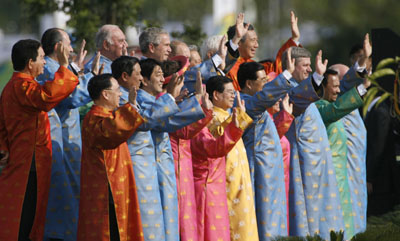APEC summit concludes with declaration
By Sun Shangwu (chinadaily.com.cn)Updated: 2006-11-19 18:57
HANOI: Asia-Pacific leaders Saturday promised bigger efforts to realize free and open trade and investment in the region, and also appealed for solutions to end the nuclear problem on Korean Peninsula.
|
|
Leaders of the 21-member group adopted the Hanoi Declaration after concluding the two-day summit, in which they vow to advance free trade and investment, enhance human security and build stronger societies and a more dynamic and harmonious community.
They also released an oral statement on nuclear issue on Korea Peninsula before donning traditional Vietnamese silk ao dai tunics for the annual family photo.
Leaders agreed to promote regional economic integration, but put off the US-backed idea of creating an APEC-wide free trade zone until 2007.
"We instructed officials to undertake further studies on ways and means to promote regional economic integration, including a Free Trade Area of the Asia-Pacific as a long-term prospect," said the declaration. The study results will be reported to the 2007 APEC summit in Australia, they said.
The group, representing roughly half of world trade and nearly 60 per cent of the world economy, reaffirmed the support to jump-start the Doha Round of global trade talks.
"The consequences of the failure of the Doha Round would be too grave for our economies and for the global multilateral trading system," said the declaration.
Summit participants are determined "to continue efforts to combat terrorism in every form and manifestation," but said that "any measures taken to combat terrorism must comply with our international obligations."
Chinese President Hu Jintao told the meeting in the morning that terrorism should be tackled with a comprehensive strategy.
"We should tackle both the symptom and the root cause," said Hu, calling for removing the breeding group for terrorism.
The APEC leaders also discussed co-operation on mitigation of pandemic disease, the fight against HIV/AIDS and dealing with emergency preparedness and disaster response.
They believed that energy security is "critical for sustainable economic development" and urged member economies to facilitate energy investment and cross-border energy trade, to develop new and renewable energy sources and technologies to ensure cleaner use of fossil fuels and to boost energy efficiency and conservation.
When touching the energy issue, President Hu said that the application of advanced technology and the establishment of a stable energy-supplying system in the global market are both important.
China is willing to make joint efforts with APEC members to safeguard energy security and achieve sustainable development in the region.
The Declaration does not include the nuclear issue on Korean Peninsula, which became a focus of attention at the APEC forum. All members of the Six-Party talks, with exception to DPRK, all took part in the summit.
DPRK conducted a test of nuclear device on October 9, drawing international condemnation. It later announced to rejoin the stalled Six-Party talks, which involved DPRK, US, Republic of Korea, China, Russia and Japan.
Leaders released an oral statement, which expressed "strong concern" about its nuclear test, called for full implementation of UN resolutions against DPRK and urged the Pyongyang to fulfill a September 2005 agreement that committed it to give up nuclear arms in return for security and aid guarantees, according to Vietnamese President Nguyen Minh Triet.
However, some delegates said they do not want to see the dominance of security issues at the summit.
Malaysian Prime Minister Abdullah Ahmad Badawi complained on Saturday that security issues have hijacked the APEC forum. He urged the members to shift their focus back to the original role of fostering trade and economic growth.
"APEC should return to its original purpose as an instrument for promoting economic growth through fostering freer and fairer flow of trade," said Abdullah.
In the past one week, a series of APEC meetings, including Concluding Senior Officials' Meeting, Business Advisory Council meeting, Ministerial Meeting, CEO Summit as well as the APEC Economic Leaders' Meeting were held in the Vietnamese capital.
Founded in 1989, APEC is a major regional forum for promoting open trade and practical economic and technical co-operation in the Asia-Pacific region.
|
||
|
||
|
|

